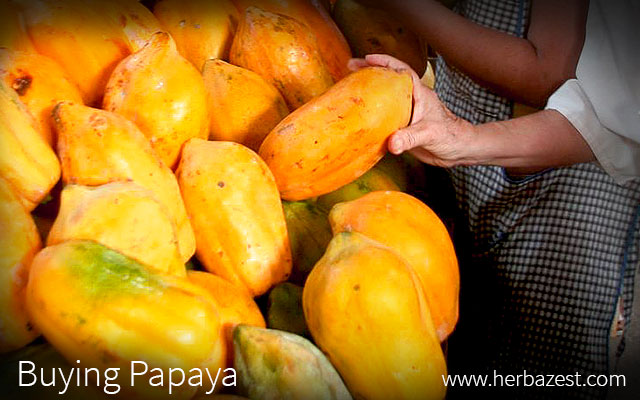The commercial market for papaya centers on its fruits and byproducts. Yet with prior research and planning, various other parts of the plant are available for purchase.
Where to Buy Papaya Fruit
Local grocery stores and fresh food markets are among the easiest places to buy papaya fruit. Their price and availability conform to both seasonal and location-based market trends.
The United States remains the world's largest importer of papaya fruit, absorbing over half the international supply.
Because they grow throughout tropical regions, papayas are cheaper in local markets, and must be exported for sale in cooler areas. They are most abundantly available in countries like Mexico, India, Brazil, Nigeria, and Indonesia.
At around $2.50 USD per pound (450 g), the Hawaiian papaya commands premium rates for the sweet flavor and superior quality of their fruits. Even within the continental U.S., they are the most expensive papayas to import because they are shipped via air instead of by sea. The cheapest papaya fruits for sale, at a little over one dollar per pound (450 g), tend to be those imported from Mexico and Belize.
Meanwhile, the United Kingdom absorbs nearly 13% of all E.U. papaya imports. Improvements in marketing and post-harvest handling are at least partially responsible for the vigorous resurgence, following a decade long disinterest with the fruits.
Papaya Plants for Sale
Many people looking to buy papaya trees for their home gardens stand a good chance of finding them at local plant nurseries and in the gardening section of home improvement stores for about $20 USD or less. Because the type of papaya influences its size and appearance, as well as its flavor and growing characteristics, it is best to inquire about specific papaya varieties and types, as well as where the plant was grown prior to purchase.
Although many Hawaiian varieties have been genetically-modified, they tend to have sweeter, more succulent flavors, and are the most popularly cultivated papayas in the world. European tastes tend to favor the non-GMO 'Formoso' ('Tainung') papaya from Central Mexico, an oblong, light orange-fleshed variety with sweet flavor.
As far as long-distance plant nurseries go, you can also buy papaya online via several web-only vendors and marketplaces. The selection process is made easier by verified reviews and the thorough vetting of sellers. It's worth mentioning that the bisexual (or hermaphroditic) tree is the only self-pollinating papaya plant.
Papaya Seeds for Sale
Due to certain environmental conditions, some papaya plants just don't transplant well to the outdoors. For this reason many say they prefer to start their papaya trees from fresh, viable seeds.
The obvious place to buy papaya seeds is grocery stores, super markets, and anywhere the raw fruit can be found. After scooping them out from the inner cavity and cleaning them, simply break the outer covering and lay the seeds out to dry before use. Nonetheless, online seed vendors and home improvement stores save customers time and effort by allowing them the opportunity to buy papaya seeds at about three dollars per pack.
As with the newly-sprouted plants, papaya seeds are offered in both organic and non-organic varieties. Besides their superior flavor, transgenic cultivars such as the Hawaiian 'Rainbow' and 'SunUp' have been carefully selected for their prolonged shelf lives, manageable growing habits, or enhanced resistance against viruses. Meanwhile, seeds from non-GMO cultivars such as 'Formoso' are of increasing demand as consumers search natural alternatives for growing the delicious tropical fruits.
Where to Buy Papaya Products
For a long time papaya was considered an exotic tropical delicacy, only available in areas where the fruits could be naturally cultivated. Thanks to technology and modern engineering, however, worldwide consumers can now buy papaya products all year-round.
Such is the case with papaya-flavored fruit juices, teas, candies, and cosmetics. These vary greatly in cost, but are all widely available in supermarkets, beauty stores, and online retail shops.
Also containing essential nutrients and potent medicinal action, papaya finds itself at the center of many dietary supplements and health formulations intended for general nutrition as well as the treatment of acne, digestive problems, and weight management. The going rate for a month's supply is about $10 - 12 USD throughout many drugstores and health food markets.
Where can I buy papaya fruit? tends to be one of the first questions people ask after hearing about its unique flavor and scientifically-proven healing properties. Luckily, because the demand for it has been through the roof lately, never before has it been easier to find papaya both online and locally.
Sources
- African Journal of Agricultural Research, Drug bioavailability and traditional medicaments of commercially available papaya: A review, 2013
- California Rare Fruit Growers, Papaya, Carica papaya L., Caricaceae
- International Trade Centre, European papaya market, recovering at last
- International Tropical Fruits Network, Global Papaya Market Overview
- Purdue University, Papaya, Carica papaya L.
- University of Florida, An overview of US papaya production, trade, and consumption
- University of Hawaii, Agricultural diagnostic service center – seed program. For sale seeds
- University of Tennessee, A guide to buying fresh fruits & vegetables
- US Agency for International Development, The EU market for papaya




